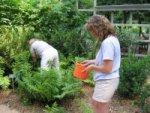 nitrogen. Back when I lived in Norfolk VA I took a gardening in the watershed class from the Virginia Institute of Marine Science. At that workshop we learned about the negative impacts nitrogen from home gardens was having on the Elizabeth River. Excessive nitrogen levels depletes oxygen in streams and lakes, ultimately threatening water quality.
nitrogen. Back when I lived in Norfolk VA I took a gardening in the watershed class from the Virginia Institute of Marine Science. At that workshop we learned about the negative impacts nitrogen from home gardens was having on the Elizabeth River. Excessive nitrogen levels depletes oxygen in streams and lakes, ultimately threatening water quality."Eutrophication is the slow, natural nutrient enrichment of streams and lakes and is responsible for the "aging" of ponds, lakes, and reservoirs. Excessive amounts of nutrients, especially nitrogen and phosphorus, speed up the eutrophication process. As algae grow and then decompose they deplete the dissolved oxygen in the water. This condition usually results in fish kills, offensive odors, unsightliness, and reducedattractiveness of the water for recreation and other public uses. These poor conditions have been observed in eastern North Carolina in the Neuse, Chowan, and Pamlico river systems. However, this condition occurs only when excessive nutrients are present; a certain amount of nitrogen and phosphorus is essential for any life to exist in water."
NCSU Nitrogen Management and Water Quality
Curiously the North Carolina Department of Agriculture doesn't test for nitrogen levels when they do soil tests. Instead they give a blanket recommendation to add 1 lb of nitrogen per 1000 sq ft. on every soil test. Since nitrogen doesn't bind to anything, it passes through the soil and into the water table very quickly. So if gardeners are simply following a blanket rule, without understanding when to fertilize and how much of what nutrients their soils need, they could be seriously contributing to our local water quality problems.
"The goal of fertilization is the intelligent replacement of plant nutrients (maximize nutrient absorption)." Plants need nitrogen but only when they are growing (spring/summer) and setting in for winter. Once plants are established, they probably won't need much nitrogen. My garden seems to be growing very nicely without any commercial fertilizer other than an occasional top dressing of mushroom compost or composted chicken manure. All the leaf mold I add as mulch improves infiltration (drainage) as it breaks down. Infiltration/drainage is another positive factor in maximizing nutrient absorption.
So all the work I've done to amend the soil in the front is working and not contributing to nitrogen leaching. However, I'm going to test the soil in the back and side yards to see if I
 can get a greater variety of plants to grow in those areas, without resorting to the use of nitrogen additives.
can get a greater variety of plants to grow in those areas, without resorting to the use of nitrogen additives.I didn't leave today's workshop with a clear understanding of how to improve the problematic soils on my side and backyards, but I did meet an Orange County Master Gardener who I will be calling for advice since she too gardens organically.
I did learn enough today to confirm my feelings that we need to look more carefully at how residential yard and garden practices may be contributing to algae growth and odor in our lakes and streams.
Pictures from Workshop
No comments:
Post a Comment